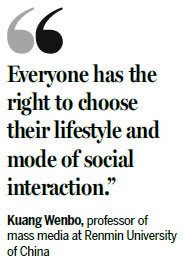Just turn it off. That's the message a lot of Chinese users of WeChat are sending about the constant stream of updates from their contacts - updates that they say are addictive and which they feel they are compelled to read.
China Youth Daily conducted a survey of 2,000 people regarding their use of WeChat. Surprisingly, 35.8 percent of respondents say they want to turn their WeChat updates off.
Nearly 20 percent say they probably will turn off the updates in the near future. About 14 percent have done so in the past.
There are, of course, other features of WeChat that people find useful - messaging, video calling and financial transactions, among other things. A majority of respondents in the survey, 64.2 percent, said they will not turn off WeChat.
In a world saturated with social media, people's lives have lost certain dimensions, experts say, as they've become immersed in cyberspace. Face-to-face interactions are fewer, while sending, replying and waiting for messages on WeChat, one of China's most popular social media platforms, has become an indispensable part of life for many.
But there's a big upside to social media as well.

Deng Chunyang, a first-grade teacher at Donggaodi Third Primary School in Beijing, said she uses WeChat to communicate with her students' parents.
"I have them in a WeChat group, and whenever I need to notify them of something, I send a message to the group," Deng said. "The first thing I do when I wake up in the morning and after I arrive home from work is to check my WeChat to see if parents have left me any messages."
Deng is not alone. Checking WeChat first thing in the morning is a common practice. Many parents have added Deng as a friend on WeChat for better interaction and communication.
"I owe much to the blocking function on WeChat. I am just like anyone else: I wear slippers and dine at street vendors," she said. "But for some parents, these things don't fit with their image of a teacher. So sometimes, I block some of them from seeing my posts."
Even with the inconveniences it may bring, Deng said she will not cut WeChat completely out of her life.
"I want to see what's happening in everyone's lives, give a few likes and leave comments. I can also get a better understanding of my students from their parents' WeChat updates."
One internet company employee, who didn't want her name used, turned off WeChat several weeks ago.
"I haven't gone on it for a month or so and I feel like I've not missed much. I have more peace," she said. "I don't have to pay attention to who's in love with who, who is calling for everyone to vote for them or who's showing off their kids again."
She said humans are surprisingly adaptable.
"Before WeChat, we were also fine," she said.
Kuang Wenbo, a professor of mass media at Renmin University of China, said caregivers for children need to exercise caution because information on WeChat has not been filtered.
"Only a minority of people proactively shut off their WeChat updates," Kuang said. "Whether it's on or off, everyone has the right to choose their lifestyle and mode of social interaction. It is crucial to make the most suitable choice."
